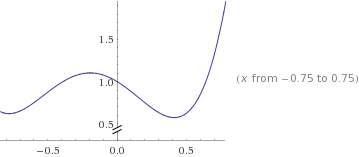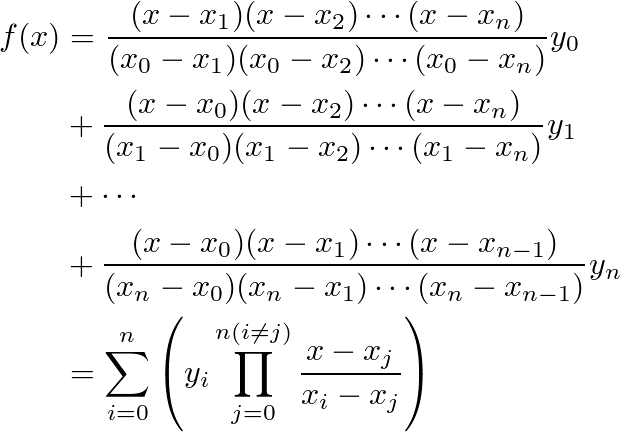C++で関数の近似(ラグランジュ補間)


をラグランジュ補間で近似する
n+1個の点 (x0, y0), (x1, y1) … (xn, yn)
が与えられているとき, これらすべての点を通る n次式は次のように表すことができる.

この式を使って, 与えられた点以外の点の値を求める.
#include <iostream> #include <iomanip> #include <math.h> using namespace std; const int N = 5; // データ点の数 // 元の関数 double f(double x) { return 4 * pow(x,4) + 3 * pow(x,3) - 2 * pow(x,2) - x + 1; } // Lagrange (ラグランジュ) 補間 double lagrange(double d, double x[], double y[]) { //double nume[N]; //nume[0] = (d - x[1]) * (d - x[2]) * (d - x[3]) * (d - x[4]); //nume[1] = (d - x[0]) * (d - x[2]) * (d - x[3]) * (d - x[4]); //nume[2] = (d - x[0]) * (d - x[1]) * (d - x[3]) * (d - x[4]); //nume[3] = (d - x[0]) * (d - x[1]) * (d - x[2]) * (d - x[4]); //nume[4] = (d - x[0]) * (d - x[1]) * (d - x[2]) * (d - x[3]) ; //double deno[N]; //deno[0] = (x[0] - x[1]) * (x[0] - x[2]) * (x[0] - x[3]) * (x[0] - x[4]); //deno[1] = (x[1] - x[0]) * (x[1] - x[2]) * (x[1] - x[3]) * (x[1] - x[4]); //deno[2] = (x[2] - x[0]) * (x[2] - x[1]) * (x[2] - x[3]) * (x[2] - x[4]); //deno[3] = (x[3] - x[0]) * (x[3] - x[1]) * (x[3] - x[2]) * (x[3] - x[4]); //deno[4] = (x[4] - x[0]) * (x[4] - x[1]) * (x[4] - x[2]) * (x[4] - x[3]) ; double sum = 0; //sum += y[0] * nume[0] / deno[0]; //sum += y[1] * nume[1] / deno[1]; //sum += y[2] * nume[2] / deno[2]; //sum += y[3] * nume[3] / deno[3]; //sum += y[4] * nume[4] / deno[4]; for (int i = 0; i < N; i++) { double prod = y[i]; for (int j = 0; j < N; j++) { if (j != i) prod *= (d - x[j]) / (x[i] - x[j]); } sum += prod; } return sum; } int main() { double x[N]; double y[N]; // 0.25刻みで -0.5〜0.5 まで, 5点だけ値をセット for (int i = 0; i < N; i++) { double d = i * 0.25 - 0.5; x[i] = d; y[i] = f(d); } // 0.05刻みで 与えられていない値を補間 for (int i = 0; i <= 20; i++) { double d = i * 0.05 - 0.5; double d1 = lagrange(d, x, y); double d2 = f(d); // 元の関数と比較 cout << setw(5) << fixed << setprecision(2) << d << ": "; cout << setw(8) << fixed << setprecision(5) << d1 << " - "; cout << setw(8) << fixed << setprecision(5) << d2 << " = "; cout << setw(8) << fixed << setprecision(5) << d1 - d2 << endl; } return 0; }
Z:\>bcc32 CP0701.cpp Borland C++ 5.5.1 for Win32 Copyright (c) 1993, 2000 Borland cp0701.cpp: Turbo Incremental Link 5.00 Copyright (c) 1997, 2000 Borland Z:\>CP0701 -0.50: 0.87500 - 0.87500 = 0.00000 -0.45: 0.93565 - 0.93565 = 0.00000 -0.40: 0.99040 - 0.99040 = 0.00000 -0.35: 1.03640 - 1.03640 = 0.00000 -0.30: 1.07140 - 1.07140 = 0.00000 -0.25: 1.09375 - 1.09375 = 0.00000 -0.20: 1.10240 - 1.10240 = -0.00000 -0.15: 1.09690 - 1.09690 = 0.00000 -0.10: 1.07740 - 1.07740 = 0.00000 -0.05: 1.04465 - 1.04465 = -0.00000 0.00: 1.00000 - 1.00000 = -0.00000 0.05: 0.94540 - 0.94540 = 0.00000 0.10: 0.88340 - 0.88340 = 0.00000 0.15: 0.81715 - 0.81715 = -0.00000 0.20: 0.75040 - 0.75040 = 0.00000 0.25: 0.68750 - 0.68750 = 0.00000 0.30: 0.63340 - 0.63340 = -0.00000 0.35: 0.59365 - 0.59365 = -0.00000 0.40: 0.57440 - 0.57440 = 0.00000 0.45: 0.58240 - 0.58240 = -0.00000 0.50: 0.62500 - 0.62500 = 0.00000
参考文献